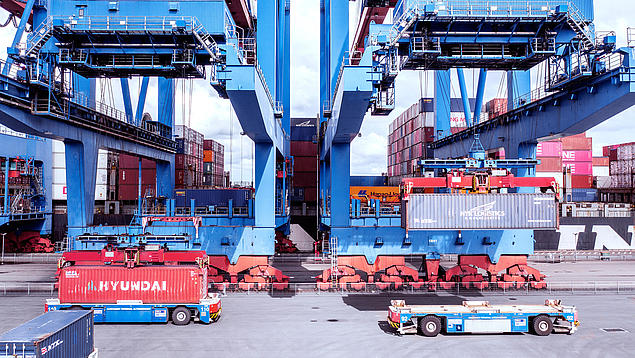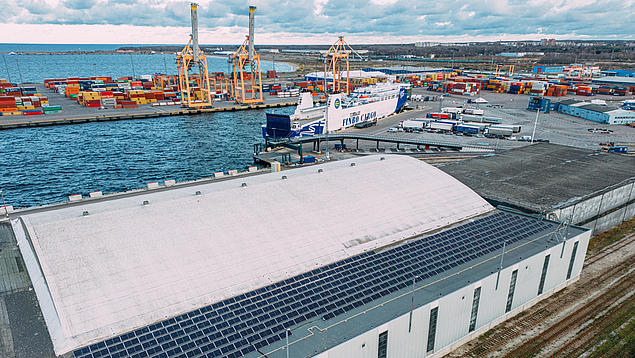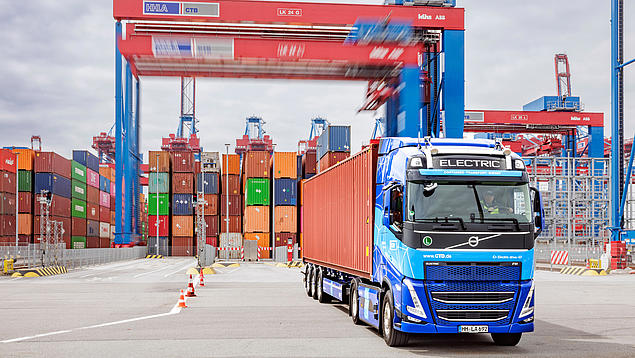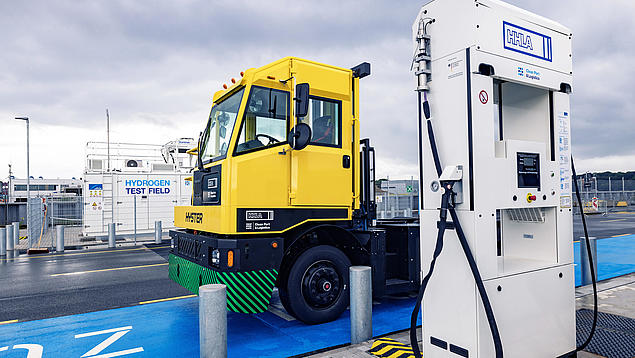Sustainable Logistics at HHLA
At HHLA, we stand for sustainability and green logistics, developing solutions for our customers that are both ecologically and economically sound. These efforts are also reflected in the implementation of our sustainability strategy under the guiding principle of Balanced Logistics.
Lower CO2 Emissions for Green Logistics
By the end of 2024, we had already reduced our CO2 emissions by 42 per cent compared to the 2018 baseline. Our goal is clear: by 2030, we want to reduce our CO2 emissions by at least 50 per cent and achieve climate-neutral production by 2040. We will achieve this by using efficient and climate-friendly terminals, intermodal logistics with electric locomotives and electric trucks, by switching to shore power in the Port of Hamburg, and by testing the use of hydrogen as an alternative fuel.

Our focus is on climate-friendly logistics chains and hubs. Efficient processes along the supply chain significantly reduce emissions. At our climate-friendly Container Terminal Altenwerder in Hamburg we use only electric, driverless transport vehicles (Automated Guided Vehicles - AGV). These, like the 14 container gantry cranes for quayside handling, the 52 fully electric gantry cranes in the container block storage area and the four rail gantry cranes, are powered by green electricity. In addition, the terminal was planned and built to minimise the use of space from the outset, which further conserves resources.

We prioritise sustainability not only in Germany, but also at our seaport terminals abroad. HHLA TK Estonia operates the largest solar park in the Port of Muuga. Even at peak times, the solar park covers more than half of the total electricity consumption in a sustainable manner. A Dual Power mobile crane, which is used to load bulk and break bulk cargo and is equipped with both an electric motor and a diesel engine, further contributes to reducing emissions.
Reducing Greenhouse Gases with Electric Locomotives and Trucks
Our climate-friendly logistics solutions extend well beyond the handling at the quayside. Our rail subsidiary METRANS makes a major contribution in this area. It organises efficient rail transport within Europe almost exclusively using electric locomotives that are suitable for the power systems in seven European countries. The METRANS network is growing continuously and dynamically. Hundreds of weekly connections help to shift more freight from the road to the more environmentally friendly railway.
Also, the “last mile” is increasingly served electrically at METRANS: in Prague, six Volvo trucks make up the largest fully electric truck fleet in the Czech Republic. The vehicles are primarily used for first- and last-mile deliveries in urban areas, where reducing noise and emissions is particularly effective. In doing so, METRANS takes another important step toward a more sustainable European transport infrastructure.
Our strength in intermodal logistics ensures sustainable and efficient supply chains that help to reduce overall emissions in the German and European transport sector.

Our container transport service (CTD) also helps to reduce emissions. As a partner in combined transport, it focuses primarily on container trucking in the Port of Hamburg, but also handles long-distance transport by truck, barge and rail. A large proportion of the trucking takes place at night or by barge on the water. This reduces the very high volume of traffic around the port during the day, thus reducing congestion and CO2 emissions. CTD is already using the first electric trucks for deliveries over the last mile. If the tests are successful, we will expand the e-fleet accordingly.
Sustainable Solutions for our Customers
We also help our customers to operate more sustainably and to future-proof their businesses. We support them in complying with strict environmental standards and in achieving their own climate targets – whether it's through environmentally friendly transport, reduced CO2 emissions when using our logistics solutions or, in principle, by working with an environmentally conscious partner like HHLA.
Hydrogen for Port Logistics
As a renewable fuel and raw material, hydrogen can play a crucial role in the energy transition and contribute to climate protection. In 2020, we co-founded the HHLA Hydrogen Network project to identify the potential of hydrogen in our own business areas and beyond. This project provides a framework for all our hydrogen activities and strategies.
In the Hamburg Clean Port & Logistics Cluster, we are working with more than 45 other companies to test hydrogen-powered equipment in port logistics. By combining our expertise in a large network, we are accelerating the transition to zero-emission heavy-duty logistics and port operations. This collaboration promotes the widespread use of renewable energies in the transport sector.

Hydrogen Refuelling Station for Commercial Vehicles
With a hydrogen refuelling station on the test field at our HHLA Container Terminal Tollerort in Hamburg, the infrastructure needed to supply heavy equipment with green hydrogen has been in place since mid-2024. Straddle carriers, empty container stackers, forklift trucks, reach stackers, tractor units and even trucks can be efficiently refuelled with hydrogen at 350 bar in the Port of Hamburg. The filling station is open to the public for commercial vehicles, offering other companies the opportunity to test climate-friendly transport solutions.
Import and Distribution of Hydrogen
Hydrogen must be made available across the board. That is why we, as a logistics group, are actively involved in projects related to the import and distribution of hydrogen. These include the lighthouse project TransHyDE, which is further developing and testing technologies for the transport and storage of hydrogen. With our network, which extends from various seaports into the European hinterland, we at HHLA are excellently equipped to advance new opportunities in hydrogen import and transport.
Sustainable Shipping: Shore Power at Hamburg Port
We are currently also working intensively on a project in Hamburg to switch to shore power. The aim is to supply container ships with electrical energy in the future so that they can switch off their engines in port. This will reduce their CO2 and pollutant emissions as well as noise pollution.
Also in the port, ships consume a significant amount of energy to maintain essential functions. Most commercial vessels rely on diesel engines for this. A two-day stay of a large container ship consumes around 14 tons of marine fuel. In the future, this energy will be supplied via shore power from renewable sources – about 72,000 kWh instead of 14 tons of diesel.
Starting January 1, 2030, this will become mandatory. The EU has decided that passenger and container ships of 5,000 GT or more must be supplied with shore-side electricity in EU ports. Hamburg, however, aims to be "shore-power ready" much earlier.
The Hamburg Port Authority (HPA) is investing a total of €100 million to build the necessary infrastructure. All four container terminals in the Port of Hamburg (three operated by us at HHLA) have already been equipped with the technology to supply large vessels with electricity. Some shipping companies, such as MSC, Maersk, and ONE, are already using shore power. In the coming years, the offering will be expanded to the short-sea segment so that by 2030 all required ship classes can be supplied. Further investments of over €100 million are still planned.
Reporting: Overview of Climate Protection Measures
We make our commitment to sustainability binding, transparent, measurable and comparable. That is why we have been publishing an annual sustainability report since 2008 and an integrated annual report since 2022.
Evaluating our measures according to the strict requirements of the EU taxonomy shows that we are playing a pioneering role in the mobility industry when it comes to sustainable logistics. In 2024, 79,7 percent of our revenue was already in line with these regulatory requirements, while the European industry average for companies in the mobility sector was 7 percent (2022). HHLA's capital expenditure (capex) of approximately €350 million (2023) was even 87 percent taxonomy-aligned.
Which Key Figures we Report
We apply the reporting standards of the Global Reporting Initiative (GRI) for sustainability reporting, which are the most widely used standards worldwide in this context. This also ensures comparability on an international scale.
We report on the Group and the joint-stock company in the form of a non-financial statement, the contents of which are embedded in the management report of the integrated annual report. This serves to fulfil the legal requirements that arise for us under the law to strengthen non-financial reporting by companies in management and group management reports (CSR Directive Implementation Act). As of 2022, information on the EU Taxonomy Regulation is also included in the Integrated Annual Report.
We operate in the midst of a large number of stakeholders with different expectations and requirements. To obtain an up-to-date picture of these expectations and requirements, we conducted a materiality analysis in November 2021 in which we examined the potentially relevant sustainability topics of internal and external stakeholders.

The Power of Networks
We connect places, companies and people – shaping the logistics of tomorrow. To achieve this, we build on intelligent solutions and the power of our networks.
Learn more